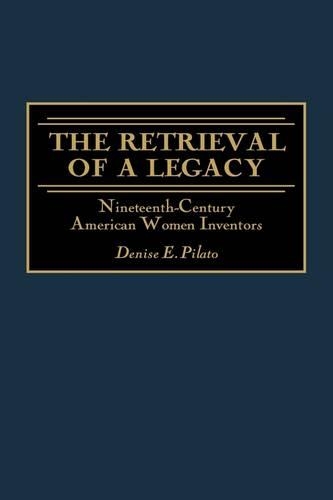
The Retrieval of a Legacy: Nineteenth-Century American Women Inventors
(Hardback)
Publishing Details
The Retrieval of a Legacy: Nineteenth-Century American Women Inventors
By (Author) Denise Pilato
Bloomsbury Publishing PLC
Praeger Publishers Inc
30th June 2000
United States
Classifications
Tertiary Education
Non Fiction
Inventions and inventors
Gender studies: women and girls
History of the Americas
609.2273
Physical Properties
Hardback
232
Description
Throughout the 19th century, women inventors developed significant technologies, yet, because of complex cultural barriers and the pervasive image of the inventor as male, their technological contributions have until now been ignored and undervalued. This study, the first to focus exclusively on 19th-century women, explores the fascinating relationship between women and technology. According to a government census, there were nearly 5,000 patents awarded to women between 1790 and 1888; further, many women invented significant technologies but never received a patent. The individual and collective experiences of these women reveal both why gendered assumptions about women and technology persist and why they are assumptions, not reality. Women invented such things as the first ice cream freezer, a pyrotechnic signal flare used extensively by the U.S. Navy, a reservoir and dam system adopted by the state of California, and more. Still, names such as Nancy Johnson, Martha Coston, and Harriet Strong are not recognized as part of the history of American technology. It was not the lack of technological ability or creativity that prevented women inventors from full participation in technological advancement. Rather educational access, legal enfranchisement, property rights, gendered standards of professionalization, and sexual division of labor constructed discriminatory barriers, limiting women's relationship with technology.
Reviews
Pilato's book will be of particular interest to women studies scholars, and also to historians of technology and 19th-century culture. Helpful bibliography; clear and accessible style. Undergraduate and graduate students.-Choice
Strongly grounded in extensive research, An Emprire Divided is a welcome and valuable addition to the historiography in the American Revolution, the Carribean, and slavery. O'Shaughnessy writes in a clear, logical manner and liberally furnishes his book with useful maps, tables, and illustrations. Both casual readers and serious scholars can gain much from this work.-The Historian
This is a valuable book for anyone interested in the achievements of women inventors during this important century. It is not a listing but rather a thoroughly researched and valuable analysis. Each of the chapters of this interesting and comprehensive book is followed--and enriched--by extensive notes.-Teachers Clearinghouse for Science and Society Education Newsletter
"Pilato's book will be of particular interest to women studies scholars, and also to historians of technology and 19th-century culture. Helpful bibliography; clear and accessible style. Undergraduate and graduate students."-Choice
"This is a valuable book for anyone interested in the achievements of women inventors during this important century. It is not a listing but rather a thoroughly researched and valuable analysis. Each of the chapters of this interesting and comprehensive book is followed--and enriched--by extensive notes."-Teachers Clearinghouse for Science and Society Education Newsletter
"Strongly grounded in extensive research, An Emprire Divided is a welcome and valuable addition to the historiography in the American Revolution, the Carribean, and slavery. O'Shaughnessy writes in a clear, logical manner and liberally furnishes his book with useful maps, tables, and illustrations. Both casual readers and serious scholars can gain much from this work."-The Historian
Author Bio
DENISE E. PILATO is an Assistant Professor of Science and Technology Studies at Eastern Michigan University./e Her teaching and research focus on historical patterns that explore the relationship between gender and technology.
